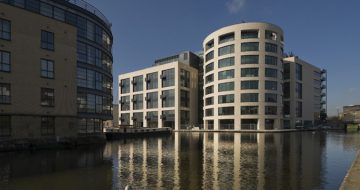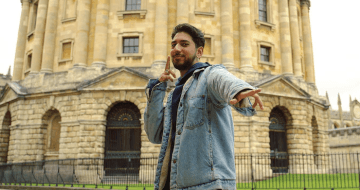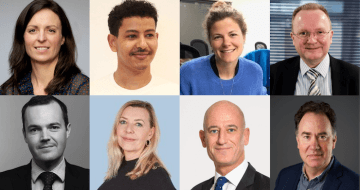Over 200 delegates descended on London’s Kings Place to discuss SQE, social mobility and more…

LegalEdCon 2022 returned in-person on Thursday 12 May, the first Legal Cheek conference since the introduction of the Solicitors Qualifying Exam (SQE) on 1 September 2021.
The SQE has brought about a major shake-up to legal education and the wider profession. Over 200 delegates arrived at our annual conference to hear about the opportunities this will bring to attracting and retaining top talent within the profession, and hear about the future of legal education and training.
LegalEdCon 2022 featured sessions including opening up the profession to diverse future lawyers; solicitor apprenticeships; legal tech and the future of training; sustainability and its importance; the practical implications of the SQE; the future of the bar; and considerations beyond the SQE. A key theme that emerged in the speakers’ (view the full speaker roster) talks was how the SQE has the potential to open up the profession to a talented cohort of more diverse lawyers.
Session 1: Thinking differently to open up the legal profession to diverse future lawyers
The speakers (part one):
• Dorothea Bannerman-Bruce, senior learning manager at Linklaters
• Rohan Samrai, future lawyer and Social Welfare Solicitors Qualifying Fund scholar
• Jordan Yohannes, trainee solicitor (secondee) at Phoenix Group
• Dr Assal Kareem, Breaking Barriers SQE scholar
In the first part of the session, we heard impassioned talks from three aspiring lawyers about how the diversity schemes they were participating in, respectively, were helping them to facilitate their dreams to become lawyers via the SQE. Rohan Samrai, future lawyer and Social Welfare Solicitors Qualifying Fund (SWSQF) scholar, spoke on how SWSQF was allowing him to qualify as a social welfare lawyer and serve disadvantaged communities.
Jordan Yohannes, trainee solicitor (secondee) at Phoenix Group, discussed how the Flex Trainee scheme is enabling her to qualify as a lawyer and overcome the cost barrier to the profession. Finally, Dr Assal Kareem, Breaking Barriers SQE scholar, moved the audience with her journey as a lecturer in Iraq to moving to the UK as a refugee, able to access a legal career because of the Breaking Barriers SQE scholarship. After these talks, Dorothea Bannerman-Bruce, senior learning manager at Linklaters, chaired a Q&A with the three to probe further into their journeys.
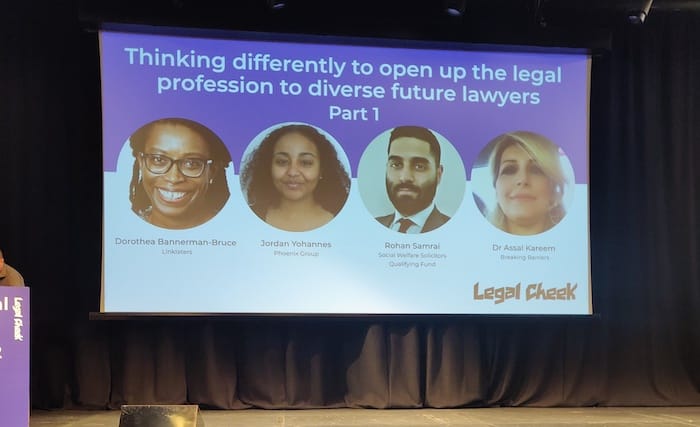
The speakers (part two):
• Lucie Allen, managing director of BARBRI Global
• Ray Berg, managing partner at Osborne Clarke
• Mary Bonsor, CEO and founder of Flex Legal
• Lorna Nsoatabe, associate at Slaughter and May
• Gemma de Cordova, barrister at Gatehouse Chambers
The second part of this session was a panel discussion and Q&A chaired by Lucie Allen, managing director of BARBRI Global. Ray Berg, managing partner at Osborne Clarke, spoke on his journey, urging the audience to re-evaluate their opinions about “what a lawyer looks or sounds like”. Mary Bonsor, CEO and founder of Flex Legal, discussed how Flex Legal was opening up the profession through Flex Trainee, a scheme which enables in-house legal teams to access the best and brightest young, diverse legal talent.
Lorna Nsoatabe, associate at Slaughter and May, touched on the importance of allyship and how inclusivity is a key driver for retention of talent, while Gemma de Cordova, a barrister at Gatehouse Chambers, highlighted the necessity for representation and mentorship within the sector to encourage more individuals into the profession.
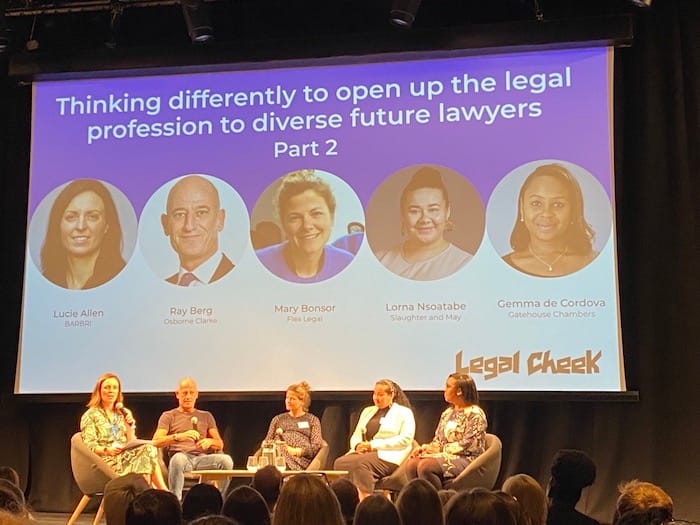
Session 2: Solicitor Apprenticeships — a new generation of qualified lawyers
The speakers:
Alison Wells, company director of legal and HR at BPP University Law School
Maia Crockford, solicitor apprentice (seconded to Sainsbury’s) at DAC Beachcroft
George Yates, solicitor apprentice at BBC
Roma Mcpherson, solicitor apprentice at Colt Technology Services
Rosie Buckley, early careers recruitment lead at Dentons
Alison Wells, company director of legal and HR at BPP, began this session with an overview of what a solicitor apprenticeship is and how it works in practice. She then handed over to Maia Crockford, solicitor apprentice (seconded to Sainsbury’s) at DAC Beachcroft, who discussed how her solicitor apprenticeship provided her with the opportunity to be the first person in her family to go to university, while giving the opportunity to have a career she loved.
George Yates, solicitor apprentice at BBC, spoke on the opportunity it afforded to have an income which provided financial independence. Roma Mcpherson, solicitor apprentice at Colt Technology Services, offered the audience an insight into how the apprenticeship was developing her both professionally and personally. Rosie Buckley, early careers recruitment lead at Dentons, described the positive relationship between solicitor apprentices and the rest of her firm and how this was helping the firm grow and develop.
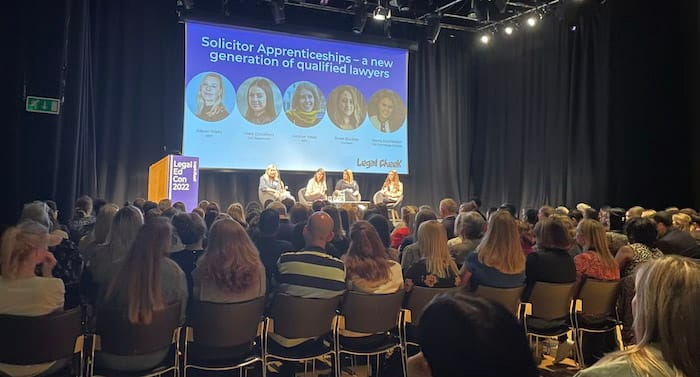
Session 3a: Legal tech and the future of training as a lawyer
The speakers:
• Siobhan McGinley, head of segment marketing at LexisNexis
• Chloe Kennedy, legal management consultant at Deloitte
• Professor Scott Slorach, director of learning & teaching at The University of York Law School
• Faisal Zainal, legal technology and innovation executive at Macfarlanes
• Nicole Tan, innovation & legal technology senior manager at Addleshaw Goddard
Siobhan McGinley, head of segment marketing at LexisNexis, kicked off the session by discussing the role legal technology plays in her job. LexisNexis, as creators of legal tech tools, familiarise their legal practitioner clients with these tools to provide them with ways to make their day-to-day more efficient.
Chloe Kennedy, legal management consultant at Deloitte, discussed her experiences at the Big Four player and described the blend of law with technology is in part driven by globalisation and clients increasingly wanting more for their money.
Professor Scott Slorach, director of learning & teaching at The University of York Law School, highlighted how law school has integrated legal tech into students’ education and how this contributes to their development, both during university and beyond.
Our lawtech session is underway! 🤖 #LegalEdCon22 pic.twitter.com/M6GXjLHMB0
— Legal Cheek (@legalcheek) May 12, 2022
After Faisal Zainal, legal technology and innovation executive at Macfarlanes, studied the Legal Practice Course (LPC) he was drawn to legal tech to be a part of the “modernisation of inefficient processes”.
Nicole Tan, innovation & legal technology senior manager at Addleshaw Goddard, had her interest in legal tech sparked when she worked as a legal manager at Freshfields and echoed similar reasons for entering the sector.
Session 3b: Why law firms need to take sustainability seriously to attract the best talent
The speakers:
• Laura Yeates, founder of the Sustainable Recruitment Alliance and head of graduate talent at Clifford Chance
• Sasha Langeveldt, project manager at Students Organising for Sustainability UK
• Joshua Rutt, Sustainable Recruitment Alliance Student Advisory board member and future trainee solicitor at Macfarlanes
• Maria Connolly, partner and head of real estate and energy & renewables at TLT
• François Feuillat, partner at Willkie Farr & Gallagher
Laura Yeates, founder of the Sustainable Recruitment Alliance, highlighted that early talent plays a critical part in improving the legal industry’s sustainability practices. She shared the three-phase approach adopted by the Alliance — ‘review, reduce, report’ — to help signatories achieve sustainability objectives. Joshua Rutt, Sustainable Recruitment Alliance Student Advisory board member, and Sasha Langeveldt, project manager at Students Organising for Sustainability UK, emphasised the weight that students nowadays place on an ethical employer, revealing that students would rather earn less if it meant working for an employer who shares their values.
Partners Maria Connolly and François Feuillat encouraged law firms to continue to review their practices, noting that ESG (environmental, social and governance) matters have come to the fore.
The resounding message from the panel was that now is the time for action from both students and employers — it is up to each of us to champion change in the industry.
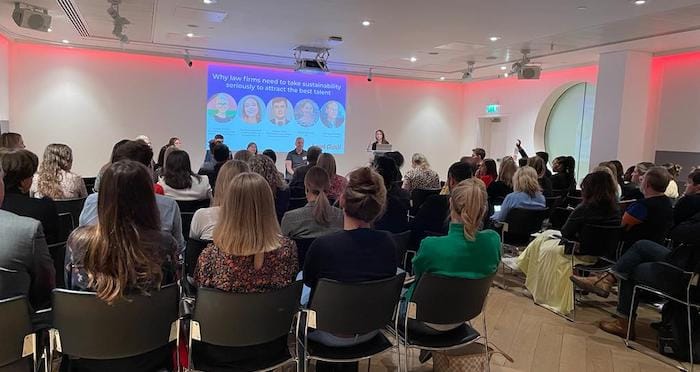
Session 4a: What does the SQE mean in practice?
The speakers:
• Maxine Warr, head of education and training at the Solicitors Regulation Authority
• Morette Jackson, director of business development at The University of Law
• Laura Yeates, head of graduate talent at Clifford Chance
• Tim West, partner at Herbert Smith Freehills
In the first of two sessions on the SQE, a panel of speakers discussed the practical implications the new training regime is having — and will have — on education and training.
Maxine Warr, head of education and training at the SRA, reflected on the SQE’s journey from concept to introduction, noting the first cohort of students had now completed both parts of the new assessment, with results for the latter part due to be released in August.
Director of business development at The University of Law, Morette Jackson, referenced the law school’s efforts to create and develop a range of SQE prep courses with innovation at their core. She drew comparisons between dating and students selecting the most appropriate course: “students need to find the one they connect with and what matters to them”, she said.
We are live at one of our first two afternoon sessions 'What does the SQE mean in practice?' with speakers from @sra_solicitors, @UniversityofLaw, @Clifford_Chance and @HSFgraduatesUK 🤩 pic.twitter.com/xN02phy1CD
— Legal Cheek (@legalcheek) May 12, 2022
Laura Yeates, head of graduate talent at Clifford Chance, explained how the firm had spent time “reflecting” on what it wanted to achieve through the new regime, and revealed it had chosen to “front load” its prep through a bespoke course designed in partnership with ULaw.
Herbert Smith Freehills partner Tim West provided delegates with an overview of how the firm plans to integrate the SQE. As part of the City Consortium, future trainees will complete a “bespoke” SQE programme with BPP.
Session 4b: The future of education and training at the bar
The speakers:
• Steven Barrett, Big Voice London chair and barrister at Radcliffe Chambers
• Mark Keith, director of programmes at BPP University Law School
• Jacqueline Cheltenham, national BPTC and BPC programme director at The University of Law
• Chris Kessling, vice dean at The Inns of Court College of Advocacy
• Mark Neale, director general of the Bar Standards Board
Having heard from various speakers on the solicitor-side of the profession earlier in the day, the afternoon session in the St Pancras Room at LegalEdCon 2022 was dedicated to everything education and training at the bar.
Mark Neale, director general of the Bar Standards Board, kicked off a series of presentations looking at the bar reforms over the past three years from a regulatory perspective.
Adding law school insights were Jacqueline Cheltenham, national BPTC and BPC programme director at The University of Law, and Mark Keith, director of programmes at BPP University Law School. Both speakers discussed how we can be re-thinking bar training in response to regulatory change and learning from the past and present to best serve prospective barristers of the future.
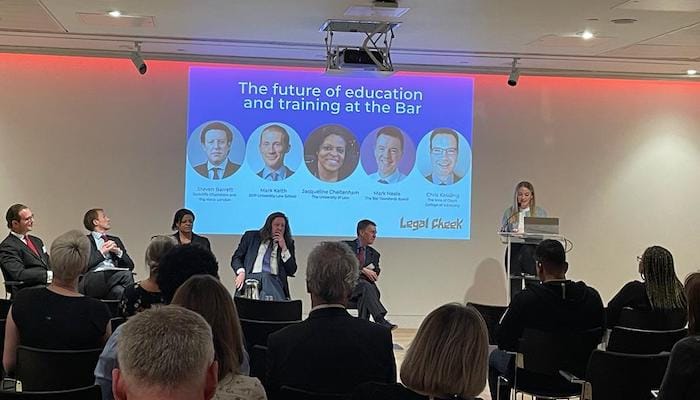
Big Voice London chair and barrister at Radcliffe Chambers, Steven Barrett, encouraged the audience to consider whether radical change is needed in education and training at the bar, drawing attention to the current burden on young people looking to qualify and the need for greater diversity in the profession.
Rounding off the session, Chris Kessling, vice dean at the Inns of Court College of Advocacy, discussed the ICCA’s position in the market and its return to bar training. This was followed by an audience Q&A session exploring topics including what more the bar could be doing to promote itself and whether it could be going further with innovative course design.
Session 5: Beyond the SQE
The speakers:
• Dr Giles Proctor, chief executive officer of The College of Legal Practice
• Joy Davies, principal lecturer at Nottingham Law School
• Professor Peter Hungerford-Welch, associate dean (postgraduate and professional programmes) at The City Law School
• Susan Cooper, founder and CEO of Accutrainee
• Grace Strutton, head of people & development at Lawyers on Demand
In this session the audience heard about some of the far-reaching effects that the SQE will have on training as a lawyer.
At the heart of the changes is the fact that students will be able to take qualification into their own hands. This is potentially quite disruptive as it will mean paralegals will use the new Qualifying Work Experience (QWE) system to become solicitors without the need to secure a formal training contract.
Susan Cooper, founder and CEO of Accutrainee, a pioneer of flexible training contracts, expects her experience of working with companies’ in-house legal teams to find students training placements to become ever more popular under the new regime.
Indeed, Lawyers on Demand (LoD), the flexible lawyering firm, has launched a similar model where its paralegals can qualify as solicitors under the SQE through time spent with big clients such as Airbnb and Adidas. LoD head of people & development Grace Strutton said the scheme already has 20 trainees.
For the College of Legal Practice, a new entrant SQE provider backed by former magic circle lawyers, this is an opportunity to work with the likes of Accutrainee to create innovative new study programmes tailored to students’ needs. CEO Giles Proctor outlined his vision for the years ahead.
Nottingham Law School, meanwhile, sees a gap in the market for qualified junior lawyer training amid a concern that SQE-qualified solicitors may have knowledge gaps in certain more specialist practice areas. Joy Davies, principal lecturer at Nottingham, explained her plans to support firms in this area.
Professor Peter Hungerford-Welch, associate dean at The City Law School, expects the upheaval and dash of chaos wrought by the SQE to end up placing a premium on an education at a traditional university law school — so long as the learning is delivered with a healthy dose of employability training.
We are live at the final session of #LegalEdCon22 'Beyond the SQE' 🔎with speakers from @collegalpract @NLS_NTU @CityLawSchool @Accutrainee and @LOD_Law pic.twitter.com/75o08Vz277
— Legal Cheek (@legalcheek) May 12, 2022
Keynote by legal education YouTuber Ibrahim Mohamed
Ibrahim Mohamed, Britain’s top legal education YouTuber and a future trainee solicitor, delivered the keynote speech. In this keynote, he dismantled what he describes as unhelpful “diversity terms”, explaining why the use of terms such as ‘BAME’ and ‘state school’ were “problematic”. He explored the microaggressions most faced by future graduates, the psychology behind the ‘resilient diverse candidate’ and wrapped up with the five A’s that students want to see from law firms, their colleagues and higher education institutes committed to making a change — these A’s being acknowledgment, accountability, access, accommodation and advice.
https://www.instagram.com/p/CdoAPUGKxHt/?utm_source=ig_web_copy_link
Legal Cheek publisher, Alex Aldridge, brought the conference to a close, thanking the speakers, delegates and headline sponsors BARBRI, BPP University Law School and The University of Law, as well as silver sponsors LexisNexis, The City Law School, The College of Legal Practice, Nottingham Law School, Flex Legal, The Sustainable Recruitment Alliance and The Food Chain.
@legalcheek Little sneak peak of LegalEdCon22 👀 #sqe #trainingcontract #lawyersoftiktok #lawfirms #lawschools #uni ♬ About Damn Time – Lizzo
